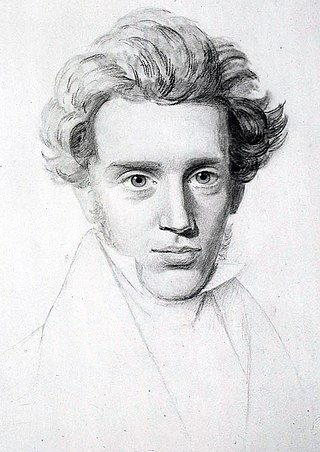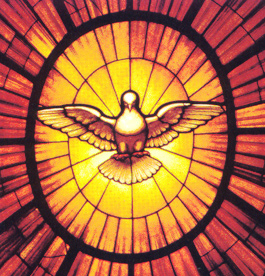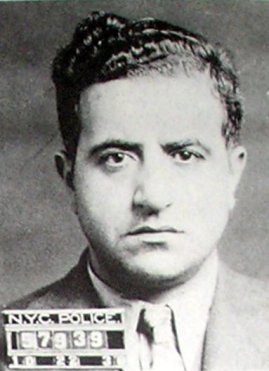
Predestination, in theology, is the doctrine that all events have been willed by God, usually with reference to the eventual fate of the individual soul. Explanations of predestination often seek to address the paradox of free will, whereby God's omniscience seems incompatible with human free will. In this usage, predestination can be regarded as a form of religious determinism; and usually predeterminism, also known as theological determinism.

Søren Aabye Kierkegaard was a Danish theologian, philosopher, poet, social critic, and religious author who is widely considered to be the first Christian existentialist philosopher. He wrote critical texts on organized religion, Christianity, morality, ethics, psychology, and the philosophy of religion, displaying a fondness for metaphor, irony, and parables. Much of his philosophical work deals with the issues of how one lives as a "single individual", giving priority to concrete human reality over abstract thinking and highlighting the importance of personal choice and commitment.

The Trinity is the Christian doctrine concerning the nature of God, which defines one God existing in three, coeternal, consubstantial divine persons: God the Father, God the Son and God the Holy Spirit, three distinct persons (hypostases) sharing one essence/substance/nature (homoousion).

Grand Duchess Anastasia Nikolaevna of Russia was the youngest daughter of Tsar Nicholas II, the last sovereign of Imperial Russia, and his wife, Tsarina Alexandra Feodorovna.

Anna Anderson was an impostor who claimed to be Grand Duchess Anastasia of Russia. Anastasia, the youngest daughter of the last Tsar and Tsarina of Russia, Nicholas II and Alexandra, was murdered along with her parents and siblings on 17 July 1918 by Bolshevik revolutionaries in Yekaterinburg, Russia, but the location of her body was unknown until 2007.
Nontrinitarianism is a form of Christianity that rejects the orthodox Christian theology of the Trinity—the belief that God is three distinct hypostases or persons who are coeternal, coequal, and indivisibly united in one being, or essence. Certain religious groups that emerged during the Protestant Reformation have historically been known as antitrinitarian.
Impassibility describes the theological doctrine that God does not experience pain or pleasure from the actions of another being. It has often been seen as a consequence of divine aseity, the idea that God is absolutely independent of any other being, i.e., in no way causally dependent. Being affected by the state or actions of another would seem to imply causal dependence.

Anastasia is a 1997 American animated musical historical fantasy film produced and directed by Don Bluth and Gary Goldman from a screenplay by the writing teams of Susan Gauthier and Bruce Graham, and Bob Tzudiker and Noni White, and based on a story adaptation by Eric Tuchman. It features songs written by Stephen Flaherty and Lynn Ahrens and a musical score composed and conducted by David Newman. The film stars the voices of Meg Ryan, John Cusack, Kelsey Grammer, Christopher Lloyd, Hank Azaria, Bernadette Peters, Kirsten Dunst, and Angela Lansbury. The film shares its plot with the 1956 film Anastasia, which in turn was based on a play by Marcelle Maurette. Unlike those treatments, this version adds Grigori Rasputin as the main antagonist.

Karl Rahner was a German Jesuit priest and theologian who, alongside Henri de Lubac, Hans Urs von Balthasar, and Yves Congar, is considered to be one of the most influential Catholic theologians of the 20th century. He was the brother of Hugo Rahner, also a Jesuit scholar.

Job is the central figure of the Book of Job in the Bible. In Islam, Job is also considered a prophet.
A personal god, or personal goddess, is a deity who can be related to as a person (anthropomorphic), instead of as an impersonal force, such as the Absolute. In the context of Christianity and other Abrahamic religions, the term "personal god" also refers to the incarnation of God as a person. In the context of Hinduism, "personal god/goddess" also refers to Ishtadevata, a worshipper's personal favorite deity.

In Eastern Christianity, a passion bearer is one of the various customary titles for saints used in commemoration at divine services when honouring their feast on the Church Calendar; it is not generally used by Catholics of the Roman Rite, but it is used within the Eastern Catholic Churches.

The Inner Circle is a 1991 drama film by Russian director Andrei Konchalovsky, telling the story of Joseph Stalin's private projectionist and KGB officer Ivan Sanchin between 1939 and 1953, the year Stalin died. Sanchin is played by Tom Hulce, and the film co-stars Lolita Davidovitch and Bob Hoskins. The film is based on a true story and is an American, Italian and Russian production. It is in English and has a running time of 137 minutes.

Princess Anastasia Petrović-Njegoš of Montenegro was the daughter of King Nikola I Petrović-Njegoš of Montenegro (1841–1921) and his wife, Queen Milena (1847–1923). Through her second marriage, she became Grand Duchess Anastasia Nikolaevna Romanova of Russia. She and her sister "Militza", having married Russian royal brothers, were known colloquially as the "Montenegrin princesses" during the last days of Imperial Russia, and may have contributed to its downfall by the introduction of Grigori Rasputin to the Empress Alexandra.

In Christianity, God is the eternal, supreme being who created and preserves all things. Christians believe in a monotheistic conception of God, which is both transcendent and immanent. Christians believe in a singular God that exists in a Trinity, which consists of three Persons: God the Father, God the Son, and God the Holy Spirit. Christian teachings on the transcendence, immanence, and involvement of God in the world and his love for humanity exclude the belief that God is of the same substance as the created universe but accept that God the Son assumed hypostatically united human nature, thus becoming man in a unique event known as "the Incarnation".
Philip Mangano was an Italian-born caporegime and second consigliere in what was then the Mangano crime family in New York City and reigned consigliere for 20 years between 1931 and 1951 when his brother, Vincent, was boss.
Christian theology is the theology – the systematic study of the divine and religion – of Christian belief and practice. It concentrates primarily upon the texts of the Old Testament and of the New Testament, as well as on Christian tradition. Christian theologians use biblical exegesis, rational analysis and argument. Theologians may undertake the study of Christian theology for a variety of reasons, such as in order to:

For the majority of Christian denominations, the Holy Spirit, or Holy Ghost, is believed to be the third divine person of the Trinity, a triune god manifested as God the Father, God the Son, and God the Holy Spirit, each being God. Nontrinitarian Christians, who reject the doctrine of the Trinity, differ significantly from mainstream Christianity in their beliefs about the Holy Spirit. In Christian theology, pneumatology is the study of the Holy Spirit. Due to Christianity's historical relationship with Judaism, theologians often identify the Holy Spirit with the concept of the Ruach Hakodesh in Jewish scripture, on the theory that Jesus was expanding upon these Jewish concepts. Similar names, and ideas, include the Ruach Elohim, Ruach YHWH, and the Ruach Hakodesh. In the New Testament the Holy Spirit is identified with the Spirit of Christ, the Spirit of Truth, and the Paraclete (helper).

Umberto "Albert" Anastasia was an Italian-American mobster, hitman and crime boss. One of the founders of the modern American Mafia, and a co-founder and later boss of the Murder, Inc. organization, he eventually rose to the position of boss in what became the modern Gambino crime family. He also controlled New York City's waterfront for most of his criminal career, mainly through the dockworker unions. Anastasia was murdered on October 25, 1957, on the orders of Vito Genovese and Carlo Gambino; Gambino subsequently became boss of the family.

Anastasianism or the Ringing Cedars falls into the category of (right-wing) esotericism and considers itself to be a new religious movement, often classified as New Age, that started in central Russia in 1997 and has since spread across the world. Ringing Cedars' Anastasians are sometimes categorised by scholars as part of Rodnovery, and often as a modern Pagan movement of their own. The Anastasians also define their life conception as Russian Vedism and themselves as Vedrussians (ведруссы), and Anastasianism has therefore often been classified among the various self-styled "Vedic" religions arising in post-Soviet Russia. The movement is closely linked to right-wing extremists and antisemitic conspiracy theorists in some countries: German constitutional protection authorities classify the movement as a right-wing extremist suspect; the State Security Service in Austria also observes it.













